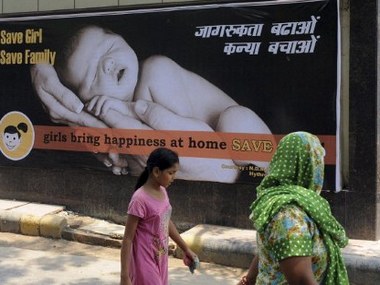By Hasan Suroor London: Are they innocent victims of Britain’s simmering culture wars? Or guilty of importing regressive practices to Britain? After forced marriages and ’’honour’’ killings, Asian immigrants are facing allegations of ‘’ gendercide’’ after two Indian-origin doctors were secretly filmed offering to arrange terminations for undercover reporters posing as pregnant mothers who did not want a girl child on discovering the sex of the foetus. Dr Prabha Sivaraman of Manchester and Dr Palaniappan Rajmohan of Birmingham are being investigated and face criminal prosecution. They could also be stripped of their right to practise as doctors in Britain. Sex selection is illegal in Britain and many British women reportedly go abroad, including to India, for abortions. But, curiously, there is no bar on finding out the sex of an unborn baby so long as it is then not used as a ground to seek termination. The sting operation by The Daily Telegraph, which caught Dr Sivaraman and Dr Rajmohan on the wrong foot, followed claims that “gendercide” was widespread among Britain’s Asian communities, particularly Indians. [caption id=“attachment_113683” align=“alignleft” width=“380”]  A billboard in India on protecting girl children. Image used for representational purporses. [/caption] According to an Oxford University study, Indian women giving birth in Britain terminated more female than male unborn babies between 1990 and 2005. The government appeared to confirm this. It released data which showed that the birth ratio among certain immigrant groups was skewed in favour of boys. It suggested that this could be because illegal abortion “unwanted” girls might be taking place among some groups for social and cultural reasons. “While the overall United Kingdom birth ratio is within normal limits, analysis of birth data for the calendar years from 2007 to 2011 has found the gender ratios at birth vary by mothers’ country of birth,” the Tory health minister Earl Howe told MPs, adding that among some nationalities the variation fell ‘’outside of the range considered possible without intervention’’. Indian immigrants admit that sex-selection is a ‘’’problem’’ but say that claims about ‘’widespread’’ gender-based abortions are ‘’vastly exaggerated’’. ‘’Yes, there is an issue here but to suggest that it is common is absurd,’’ Dr Shiv Pande of Indo-British Association told FirstPost. Describing sex-selection as ‘’illegal and morally wrong’’, the Health Department warned that ‘’if anyone has evidence of sex-selection abortions being performed in specific cases, we will refer them to the police to investigate’’. While Dr Rajmohan has been suspended by the General Medical Council from practising altogether pending further investigation, Dr Sivaraman has been barred from authorising “any termination of pregnancy or carry out any termination of pregnancy work, either by consultation or surgery”. The Crown Prosecution Service (CPS) is under growing pressure to review its original decision not to charge them despite claiming that there was a ‘’realistic’’ prospect of conviction. Its reluctance to explain why it did not pursue them has prompted accusations of ‘’political correctness’’ with critics alleging that it is afraid of offending cultural sensitivities of ethnic groups. “I certainly hope it’s not [for cultural reasons] because that would be a serious error and it would lead to partiality in prosecution decision,” said (Lord) Ken MacDonald, former head of CPS. Health Secretary, Jeremy Hunt, has demanded ‘‘urgent clarification’’ while the Opposition Labour Party has called the CPS decision “scandalous”. Critics of multiculturalism have seized on the row to renew their attacks on a policy that, they say, allows immigrants to “import” their own cultural practices to Britain and “abuse” British values. There have also been calls to strengthen the 1967 Abortion Act after experts pointed out that it did not lay down specific grounds for refusing abortion. More a catalogue of “dos” rather than “don’ts”, it simply states that an abortion can be performed if two doctors decide “the continuance of the pregnancy would involve risk to the life of the pregnant woman, or of injury to the physical or mental health of the pregnant woman or any existing children of her family, greater than if the pregnancy were terminated”. Ann Furedi, chief executive of British Pregnancy Advisory Service (BPAS) which carries out more than a quarter abortions in England and Wales, points out that if doctors decide that going through with a pregnancy will damage the mental health of the mother-to-be, then abortion is within the law. The key legal ground for abortion is the doctors’ judgement whether having a child would cause mental distress to the mother irrespective of gender or the cause of pregnancy such as rape or incest. “Sex selection, like rape, may not be a ground for abortion, but there is no legal requirement to deny a woman an abortion if she has a sex preference, providing that the legal grounds are still met. The law is silent on the matter of gender selection, just as it is silent on rape and exams. Today in Britain, it seems more acceptable to say you want an abortion because you don’t want to be pregnant than to say you want an abortion because you don’t want to be pregnant with a girl. Not wanting a baby because it’s a girl – whereas you would like a baby boy – seems discriminatory, unethical, ‘consumerist’ even,” she argues. Meanwhile, anti-abortionists have found unlikely allies among many feminists who, while upholding the woman’s right to abortion, are opposed to sex-selection. But critics such as Ms Freudi argue that, ‘‘You can’t be pro-choice except when you don’t like the choice, because that’s not pro-choice at all’’ . An estimated 200,000 abortions are carried out in England and Wales every year prompting criticism that it is “available on demand”.
An estimated 200,000 abortions are carried out in England and Wales every year prompting criticism that it is “available on demand”.
Advertisement
End of Article
Written by FP Archives
see more


)

)
)
)
)
)
)
)
)



